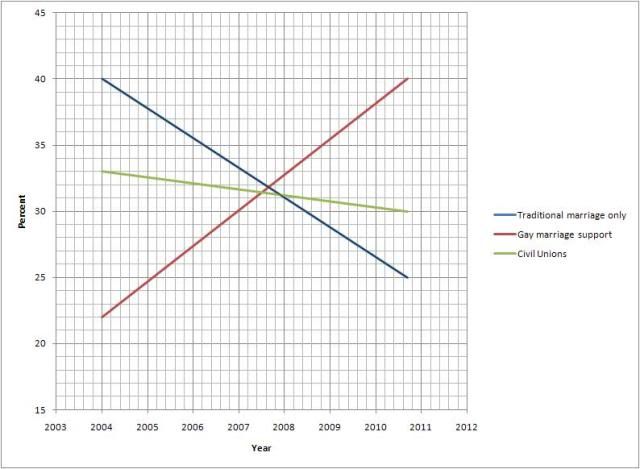I'm talking about this:
"Which comes closest to your view? Gay couples should be allowed to legally marry. OR, Gay couples should be allowed to form civil unions but not legally marry. OR, There should be no legal recognition of a gay couple's relationship."

CBS News polling on marriage.
The graph is the result of taking the results of the earliest CBS poll pollingreport.com has that asks the above question (done in 2004), and the latest CBS poll that asks the identical question (August 2010). And then drawing straight lines between the points. (The reality is that there were 12 polls asking the same question taken in between, and the results of graphing all 14 points are not, of course, completely straight lines, but that would just make the graph less perspicuous).
It's not easy to make an accurate determination of the public's view of equal marriage rights. There are a lot of polls, but each one asks a different question, or words the question differently. Some polls ask only equal marriage rights vs. heterosexual marriage, while others, like the CBS poll, ask the three-way question.
Given that civil unions or domestic partnerships do exist (New Jersey, California and Washington to name a few) or might soon exist (Hawaii), the three-way question seems to be the best way to figure out what the public thinks. And having the same polling question asked repeatedly over the course of seven years (thanks, CBS!) is a big help.
The result, as we see, is pretty dramatic. In less than seven years, the public's support for equal marriage rights vs. traditional marriage has totally flipped, from 40% down to 25% for heterosexual marriage only, and from 22% up to 40% for marriage equality, with civil union support essentially holding steady. That represents a total change in attitude of about 4% a year, 2% more favoring marriage equality and 2% less believing solely in heterosexual marriage.
One might wonder how 15% of traditional marriage adherents suddenly become marriage equality proponents? Well, they didn't, of course. What has likely happened is that most who favored only traditional marriage and switched gears now feel that civil unions are okay, while many of those who thought civil unions were the right thing in 2004 now think that marriage equality is best. Hearts and minds. Drip, drip, drip.
We also know that a couple recent polls (AP, CNN) which do not include civil unions suggest that marriage equality has reached a 50% threshold in the United States, and these CBS three-way results are consistent with those findings. If civil union advocates are forced to choose one way or another, all it would take is for 33% of them to favor marriage equality to reach a majority.
Given this significant increase in support, what are the propects for marriage equality at the state level for the next year? At least four states bear watching:
Rhode Island: If the Democrat, Caprio, or the Independent, Chaffee win the Governorship (and both are ahead of the Republican, Robitaille, by a large margin), each has stated a willingness to sign marriage equality legislation. An August 2010 poll done by Greenberg Quinlan Rosner Research found that 59% of Rhode Islanders supported legalizing same-sex marriage. It is unclear whether there is enough support in the legislature to pass such a bill, but proponents will certainly be making a strong push.
Minnesota: The Democratic candidate for Governor, Mark Dayton, who supports marriage equality, currently has a solid lead over the Republican, Tom Emmer who (surprise!) does not. Democrats also enjoy solid majorities in both Houses of their legislature, and it does not appear that the upcoming election will change who controls either House. So a vote is a definite possibility come 2011.
Maine: The Republican Gubernatorial candidate LePage, has recently taken a nosedive in the polls, much to the liking of Democratic candidate Mitchell. Mitchell has stated that she would work for and sign a marriage equality bill. It's not clear that the Maine legislature would have the courage to pass such legislation again soon, in the face of its rejection in 2009, but if polling were to indicate majority support it might find enough fortitude. Of course if the Republican is elected Governor, there is no hope for legislation in the next four years.
New York: No one knows what the composition of the New York legislature will be after election. If the Senate does remain controlled by Democrats, expect another push for marriage equality. And expect the battle to be as brutal as it was in 2009, when equality went down to spectacular defeat 24-38. But a slightly different Senate composition and two years of societal change in attitude might provide a cliffhanger vote this time.
Hawaii: It wouldn't be marriage equality, but an 'everything but marriage' civil unions bill similar to Washington State's civil union's law will likely be on the table if the Democrat, Neil Abercrombie, wins the Governorship. He is heavily favored, and he supports the civil unions bill.
It will take time. Long-held views don't change overnight. But they do change over years. And this will end well.
No comments:
Post a Comment